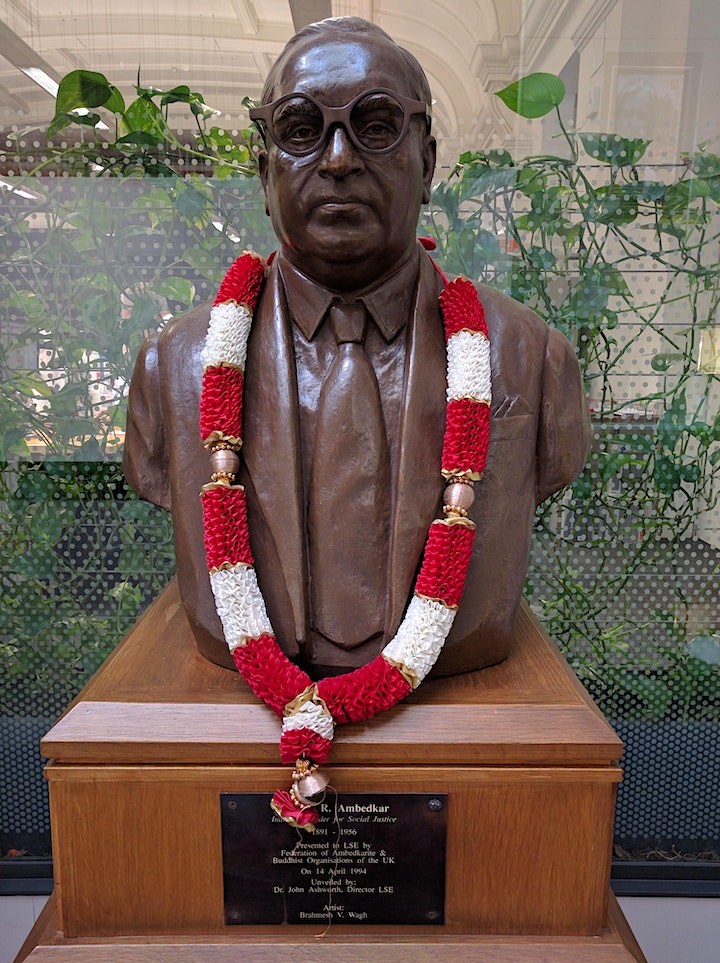Join us for a talk with the editors and authors of the recently published book, Ambedkar in London.
Dr Bhimrao R. Ambedkar (1891-1956) was one of India’s greatest intellectuals and social reformers; his political ideas continue to inspire and mobilise some of the world’s poorest and most socially disadvantaged, in India and the global Indian diaspora. Ambedkar’s thought on labour, legal rights, women’s rights, education, caste, political representation and the economy are international in importance.
This book explores his lesser-known period of London-based study and publication during the early 1920s, presenting that experience as a lens for thinking about Ambedkar’s global intellectual significance. Some of his later canon on caste, and Dalit rights and representation, was rooted in and shaped by his earlier work around the economy, governance, labour and representation during his time as a law student and as a doctoral candidate at the London School of Economics.
There will also be a chance to view the bust of Ambedkar, gifted to LSE by the Federation of Ambedkarite and Buddhist Organisations UK, and items from LSE Library archives, including Ambedkar’s student file.
Purchase the book ahead of the event.
Speakers and Chair
Santosh Dass is a former civil servant, is a human rights and equality campaigner, fighting for caste-based discrimination to be outlawed in the UK. She is Chair of the Anti Caste Discrimination Alliance, and President of the Federation of Ambedkarite and Buddhist Organisations UK.
Sue Donnelly: Prior to her retirement in 2020 Sue Donnelly worked at the LSE with responsibility for the development of LSE’s institutional archive and raising awareness of the School’s unique and fascinating history. Sue studied history at Durham University and trained as an archivist at Aberystwyth University. She began her archive career at the University of Southampton and from 1998-2013 was Head of Archives and Special Collections at LSE.
Professor William Gould is Professor of Indian History at the University of Leeds, where he teaches and publishes on the history and politics of South Asia.
Christophe Jaffrelot is Avantha Chair and Professor of Indian Politics and Sociology at the King’s India Institute, and Research Lead for the Global Institutes, King’s College London. He teaches at Sciences Po CERI, where he was director between 2000 and 2008.
Tarun Khaitan is the Professor (Chair) of Public Law at the LSE Law School and an Honorary Professorial Fellow at Melbourne Law School. Previously, he has been the Head of Research at the Bonavero Institute of Human Rights (Oxford), the Professor of Public Law and Legal Theory (Oxford), Vice Dean (Faculty of Law, Oxford), and a Visiting Professor of Law (Chicago, Harvard, and NYU law schools).
Hosts
The International Inequalities Institute at LSE brings together experts from many of the School's departments and centres to lead cutting-edge research focused on understanding why inequalities are escalating in numerous arenas across the world, and to develop critical tools to address these challenges @LSEInequalities
The British Library of Political and Economic Science (@LSELibrary) was founded in 1896, a year after the London School of Economics and Political Science. It has been based in the Lionel Robbins Building since 1978 and houses many world class collections, including the Women's Library and Hall-Carpenter Archives.
The Department of Anthropology (@LSEAnthropology) is world famous and world leading. Our work is based on ethnographic research: detailed studies of societies and communities in which we have immersed ourselves via long term fieldwork. Placing the everyday lives and meanings of ordinary people - whoever and wherever they are - at the heart of the discipline, we take nothing for granted.

Whilst we are hosting this listing, LSE Events does not take responsibility for the running and administration of this event. While we take responsible measures to ensure accurate information is given here this event is ultimately the responsibility of the organisation presenting the event.